
CANADIAN JOURNAL OF SOIL SCIENCE
Scope & Guideline
Pioneering Discoveries in Soil Health and Management
Introduction
Aims and Scopes
- Soil Health and Management:
Research on practices that enhance soil health, including tillage methods, cover cropping, and organic amendments, with a focus on their impacts on soil properties and agricultural productivity. - Soil Chemistry and Biology:
Studies investigating the chemical and biological properties of soil, including nutrient cycling, microbial activity, and the effects of contaminants, which are essential for understanding soil fertility and ecosystem health. - Environmental Impact of Soil Practices:
Analysis of how various soil management practices influence environmental factors such as greenhouse gas emissions, water quality, and soil erosion, emphasizing sustainable practices. - Soil Classification and Surveying:
Research focused on the classification of Canadian soils, including the development of new methodologies and frameworks for soil mapping and assessment. - Indigenous Knowledge and Soil Science:
Exploration of the integration of Indigenous knowledge systems with contemporary soil science practices, fostering collaboration and recognition of traditional ecological knowledge.
Trending and Emerging
- Sustainable Agricultural Practices:
There is a growing emphasis on studies related to conservation agriculture, including no-till practices and cover cropping, which aim to improve soil health and reduce environmental impact. - Climate Change and Soil Interaction:
Research exploring the interactions between soil management practices and climate change effects, particularly regarding soil carbon dynamics and greenhouse gas emissions, is on the rise. - Indigenous Perspectives in Soil Science:
The integration of Indigenous knowledge and practices into soil management and research is gaining prominence, reflecting a broader trend towards inclusivity and respect for traditional ecological knowledge. - Digital Soil Mapping and Precision Agriculture:
The application of advanced technologies, such as remote sensing and machine learning for soil mapping and monitoring, is increasingly featured, highlighting the journal's adaptation to modern methodologies. - Soil Microbial Ecology:
Emerging studies focusing on the role of soil microorganisms in nutrient cycling and soil health are becoming more common, reflecting a deeper understanding of soil biology's importance.
Declining or Waning
- Traditional Soil Fertility Studies:
Research centered solely on conventional soil fertility, without considering broader environmental impacts or sustainable practices, has decreased as interdisciplinary approaches gain traction. - Soil Erosion Studies:
While still relevant, the frequency of studies focusing exclusively on soil erosion has declined as new methodologies and integrated approaches to soil management emerge. - Non-Agroecological Soil Research:
Research that does not connect soil science with agroecological principles has waned, reflecting a growing recognition of the need for sustainability in agricultural practices.
Similar Journals

SOIL SCIENCE SOCIETY OF AMERICA JOURNAL
Connecting Research to Real-World Soil SolutionsWelcome to the SOIL SCIENCE SOCIETY OF AMERICA JOURNAL, a premier publication in the field of soil science, published by WILEY. With a distinguished history dating back to 1976, this journal has consistently provided a platform for researchers to share innovative findings and insights into soil’s critical role in agricultural and ecological systems. Featuring an impressive Q1 category ranking in Soil Science and positioned within the top 25% of its field according to Scopus, this journal is recognized for its impactful contributions to advancing our understanding of soil dynamics. While not an open-access journal, it remains a valuable resource for academics and professionals alike, with distinguished articles that meet the highest scientific standards. As it enters its converged years from 1976 to 2024, the journal aims to continue shaping the future of soil research, offering valuable knowledge to students, researchers, and practitioners dedicated to sustainable land management and environmental preservation.

Spanish Journal of Soil Science
Connecting Scientists to Transform Soil ScienceThe Spanish Journal of Soil Science is a prestigious open-access journal published by FRONTIERS MEDIA SA since 2011. Based in Switzerland, this journal serves as a vital platform for disseminating innovative research and applications within the field of soil science. With its commitment to accessibility, the journal enables researchers, professionals, and students from around the globe to contribute to and benefit from its wealth of knowledge. As of 2023, it holds a respectable Q3 category ranking in soil science and is positioned at #88 out of 159 in the Scopus rankings for Agricultural and Biological Sciences. The journal aspires to foster collaboration and communication among soil scientists, encouraging the exploration of contemporary soil issues, sustainable practices, and advancements in technology. Its open-access model ensures that the latest findings are freely available, promoting a broader impact in environmental and ecological studies.
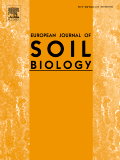
EUROPEAN JOURNAL OF SOIL BIOLOGY
Cultivating Knowledge in Soil BiologyThe EUROPEAN JOURNAL OF SOIL BIOLOGY is a leading publication through ELSEVIER FRANCE-EDITIONS SCIENTIFIQUES MEDICALES ELSEVIER, renowned for its rigorous contribution to the fields of soil science, microbiology, and insect science. Established in 1993 and continuing to thrive until 2024, this journal is recognized for its high academic standards, achieving a prestigious Q1 ranking across multiple disciplines including Insect Science, Microbiology, and Soil Science in 2023. With a Scopus rank placing it in the top tiers of relevant categories, the journal serves as a vital platform for disseminating groundbreaking research and advancements in soil biology. Although currently not an open access journal, it offers valuable insights to researchers, professionals, and students, enhancing understanding and fostering innovative solutions for global soil health challenges. The journal's ISSN is 1164-5563 and its E-ISSN is 1778-3615, offering a wealth of knowledge from an esteemed publisher situated in France.
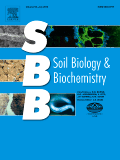
SOIL BIOLOGY & BIOCHEMISTRY
Transforming Understanding of Soil BiologySOIL BIOLOGY & BIOCHEMISTRY, published by Pergamon-Elsevier Science Ltd, is a premier academic journal that plays a pivotal role in advancing the fields of microbiology and soil science. Established in 1969, this esteemed journal has gained recognition for its rigorous publication standards and impactful research contributions, evidenced by its prestigious Q1 rankings in both Microbiology and Soil Science categories for 2023. With an impressive Scopus rank of #3 among 159 in Agricultural and Biological Sciences and #14 among 182 in Immunology and Microbiology, it boasts a notable 98th percentile in its field. The journal offers researchers, professionals, and students a vital platform for sharing innovative studies and insights about soil ecosystems and their biochemical processes, fostering greater understanding and collaboration within the scientific community. While Open Access options are currently not available, the journal remains a cornerstone for those seeking to deepen their knowledge and contribute significantly to soil biology and biochemistry.

BIOLOGY AND FERTILITY OF SOILS
Unlocking the Secrets of Soil Biology and FertilityBIOLOGY AND FERTILITY OF SOILS, published by Springer, is a leading international journal dedicated to advancing the field of soil science with a focus on the intersection of biological processes and fertility management. With its ISSN 0178-2762 and E-ISSN 1432-0789, this journal serves as a key resource for researchers and professionals alike, reflecting its esteemed status in the community, evidenced by its Q1 rankings in Agronomy and Crop Science, Microbiology, and Soil Science. Covering a broad range of topics from soil health to sustainable agricultural practices, the journal's significant impact factor underscores its critical role in driving innovative research in the domain. While not offering Open Access options, it features rigorous peer-reviewed research that spans decades, converging influential studies from 1985 to 2024. Located in Germany with offices in the United States, the journal maintains a strong international presence, providing insights that enhance the understanding and management of soil ecosystems crucial for sustainable agriculture. Researchers aiming to expand their knowledge on soil biology and fertility will find this journal an invaluable asset.
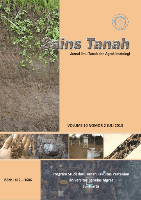
SAINS TANAH
Promoting Innovative Solutions in Soil Health and AgricultureSAINS TANAH is a renowned peer-reviewed journal that focuses on the fields of agronomy, soil science, and environmental studies, published by Universitas Sebelas Maret Surakarta in Indonesia. Established as an Open Access platform since 2001, it aims to disseminate high-quality research that addresses critical issues in soil health, crop management, and pollution, thereby fostering sustainable agricultural practices. With its current impact factor demonstrating a Category Quartile ranking of Q3 and Q4 in major areas such as Agronomy and Crop Science, Atmospheric Science, and Pollution, SAINS TANAH serves as an essential resource for researchers, professionals, and students dedicated to advancing knowledge and solutions in these vital fields. By providing a collaborative environment and upholding rigorous academic standards, the journal not only highlights the significance of Indonesian research contributions but also aims to connect local insights with global agricultural and environmental challenges.
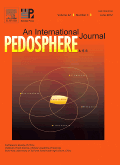
PEDOSPHERE
Bridging Disciplines to Enhance Soil UnderstandingPEDOSPHERE, published by SCIENCE PRESS, is a leading journal in the field of Soil Science, holding a prestigious position in the Q1 category as per the latest evaluations, reflecting its high impact and relevance in the domain. Established in 1996, this journal is committed to advancing our understanding of soil-related processes and their interactions with various environmental components, providing a platform for innovative and high-quality research. With an impressive rank of #13 out of 159 in the Scopus classifications for Agricultural and Biological Sciences, PEDOSPHERE reaches the 92nd percentile, indicating its significance among scholarly publications. Although the journal operates under traditional access options, it remains an essential resource for researchers, professionals, and students keen on exploring the complexities of soil dynamics and sustainability. By bridging interdisciplinary methodologies and fostering collaboration, PEDOSPHERE plays a vital role in addressing global challenges related to soil management, conservation, and ecological balance.
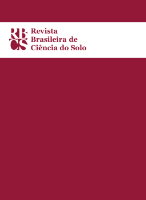
REVISTA BRASILEIRA DE CIENCIA DO SOLO
Connecting Researchers to Transform Soil PracticesREVISTA BRASILEIRA DE CIENCIA DO SOLO, published by the SOC BRASILEIRA DE CIENCIA DO SOLO, serves as a vital open-access platform for disseminating impactful research in the fields of Agronomy and Soil Science. With an ISSN of 0100-0683 and an E-ISSN of 1806-9657, this journal has been fostering academic dialogue since 2003 and has gained recognition as a Q2 journal in both Agronomy and Soil Science as of 2023. Based in Brazil and actively supporting scientists and practitioners globally, it is uniquely positioned to address the challenges and innovations in soil management and cultivation practices. The journal's Scopus rankings reflect its commitment to quality, standing at #164/406 in Agronomy and Crop Science and #74/159 in Soil Science, placing it in the top quartile of its category. Researchers, professionals, and students are encouraged to contribute their findings and insights, making it a significant resource for anyone interested in advancing the science of soil and crop stewardship.
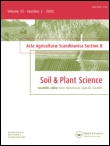
ACTA AGRICULTURAE SCANDINAVICA SECTION B-SOIL AND PLANT SCIENCE
Transforming Research into Real-World Agricultural SolutionsACTA AGRICULTURAE SCANDINAVICA SECTION B-SOIL AND PLANT SCIENCE, published by Taylor & Francis AS, is a distinguished journal dedicated to the fields of Agronomy, Crop Science, and Soil Science. With an impressive impact factor, and categorized in Q2 for both Agronomy and Crop Science and Soil Science as of 2023, this journal is an essential resource for researchers, professionals, and students aiming to advance their understanding of soil-plant interactions and sustainable agricultural practices. Operating since 1992 and continuing through to 2024, ACTA aims to publish high-quality, peer-reviewed research that encourages the applicability of advanced scientific knowledge in real-world agricultural settings. While the journal is not open access, it remains widely accessible through institutional subscriptions, reflecting its commitment to disseminating essential findings and fostering innovation in soil and plant science worldwide. Nestled in the vibrant academic environment of Norway, ACTA AGRICULTURAE SCANDINAVICA serves as a key platform for nurturing groundbreaking research that informs sustainable agricultural policies and practices globally.

EGYPTIAN JOURNAL OF SOIL SCIENCE
Exploring the Depths of Soil Health and ProductivityEGYPTIAN JOURNAL OF SOIL SCIENCE is a renowned publication dedicated to advancing the field of soil science, particularly within the context of Egypt and the broader regions of the Middle East and North Africa. Published by the NATIONAL INFORMATION DOCUMENTATION CENTER, ACADEMIC SCIENTIFIC RESEARCH & TECHNOLOGY, this journal aims to disseminate high-quality research and innovative practices related to soil management, conservation, and sustainable agricultural practices. With an emphasis on empirical studies, reviews, and methodologies relevant to soil health and productivity, this journal serves as an essential resource for researchers, professionals, and students alike. Although specific access options are not highlighted, the journal’s commitment to promoting scholarly discourse ensures that important findings within soil science are made available to wider audiences, contributing significantly to environmental science, agronomy, and ecological preservation.